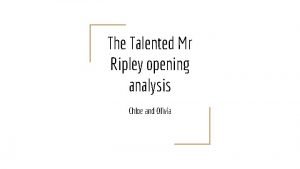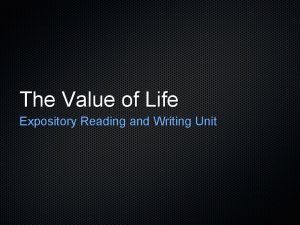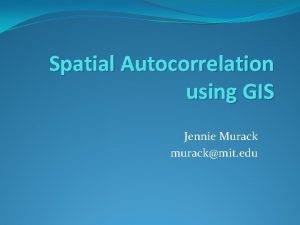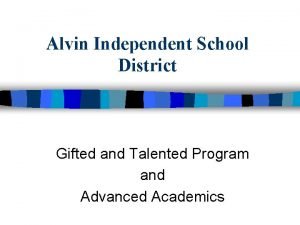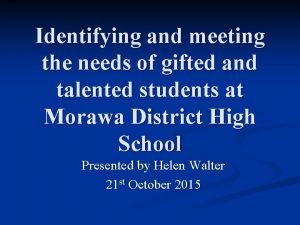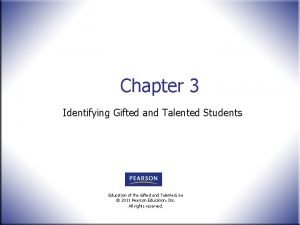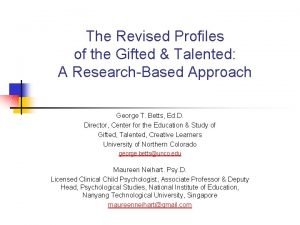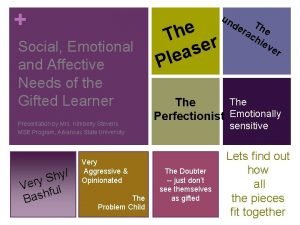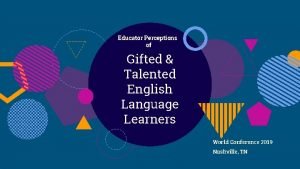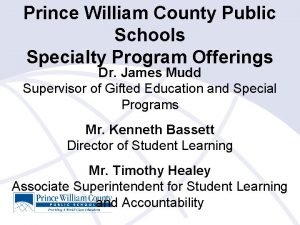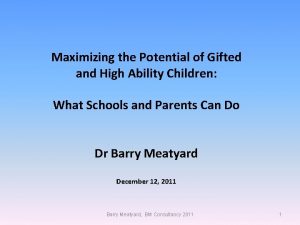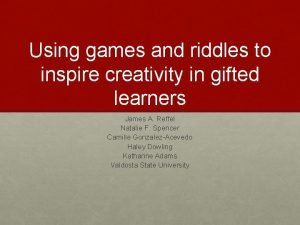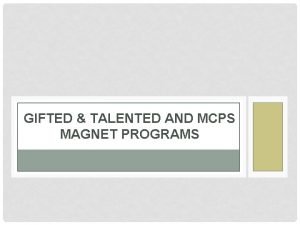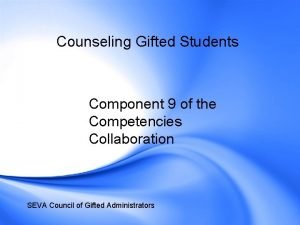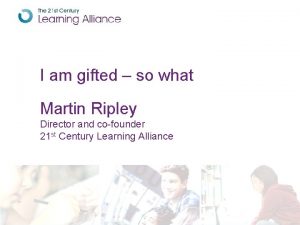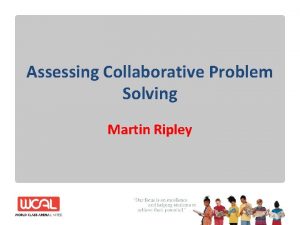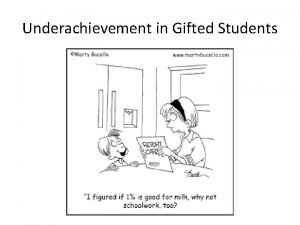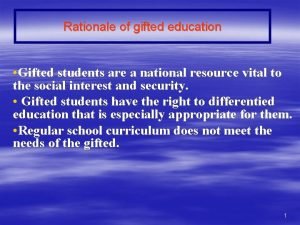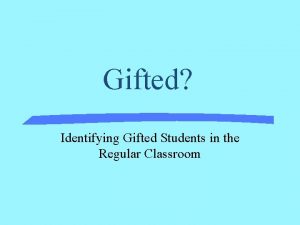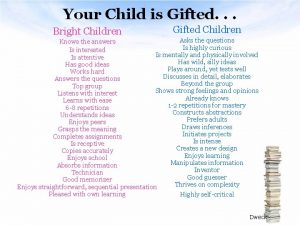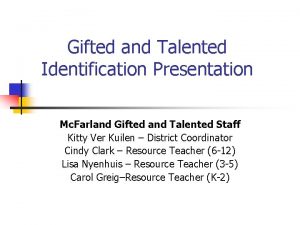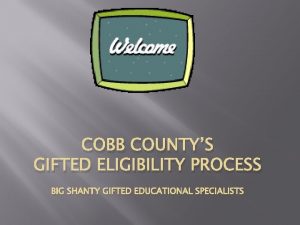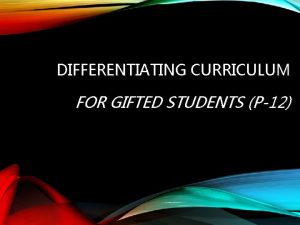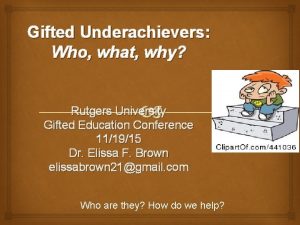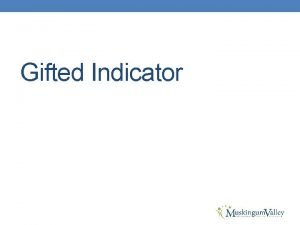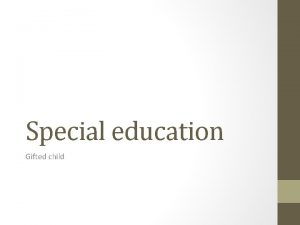I am gifted so what Martin Ripley Director






















- Slides: 22

I am gifted – so what Martin Ripley Director and co-founder 21 st Century Learning Alliance

Outline of presentation 1. Students’ experience in school 2. A Gn. T business model 3. Words from some students 4. A framework for Gn. T students’ learning

Occasional Paper 20 (1) • 2006 study investigated 18+ students • 1, 828 responses NB Key is on next slide

Occasional Paper 20 (2) 1. 2. 3. 4. 5. 6. 7. 8. Importance of being identified Has NAGTY helped your learning Has NAGTY helped your aspirations Helped you do new things Helped you engage in socially worthwhile activity Improved motivation Taken into account by your school Improved your examination results


“You’ve always had gifted and talented children, but in the past you didn’t have to identify them and provide for them. They were just the clever kids in the school. But now there are programmes available, and you’ve got to be seen to be doing different things. It’s like the buzz word at the moment, gifted and talented. I can see in five years’ time it will be something different. ” Teacher without gifted and talented remit, engaged primary school, north east “It should just fit in [to the school] like normal. We provide for the ones that are lower in ability, so why shouldn’t we provide for the ones that are higher? It’s differentiation, and that should have been provided for anyway, before the gifted and talented came out. When I looked at my class I’d always think: ‘These ones need pushing. ’” Gifted and talented coordinator, primary school, midlands “As a group of governors we have decided that we won’t go down the road of purposefully identifying these kids. Every child is important to us. All of them are gifted and talented. ” Governor, engaged primary school, south east “I don’t think the child should know that they’ve been singled out. I don’t mind him being on this thing, but I don’t want him coming home with [a letter]. ” Parent of primary school gifted and talented learner, north west

“You’ve always had gifted and talented children, but in the past you didn’t have to identify them and provide for them. They were just the clever kids in the school. But now there are programmes available, and you’ve got to be seen to be doing different things. It’s like the buzz word at the moment, gifted and talented. I can see in five years’ time it will be something different. ” Teacher without gifted and talented remit, engaged primary school, north east “It should just fit in [to the school] like normal. We provide for the ones that are lower in ability, so why shouldn’t we provide for the ones that are higher? It’s differentiation, and that should have been provided for anyway, before the gifted and talented came out. When I looked at my class I’d always think: ‘These ones need pushing. ’” Gifted and talented coordinator, primary school, midlands “As a group of governors we have decided that we won’t go down the road of purposefully identifying these kids. Every child is important to us. All of them are gifted and talented. ” Governor, engaged primary school, south east “I don’t think the child should know that they’ve been singled out. I don’t mind him being on this thing, but I don’t want him coming home with [a letter]. ” Parent of primary school gifted and talented learner, north west

“You’ve always had gifted and talented children, but in the past you didn’t have to identify them and provide for them. They were just the clever kids in the school. But now there are programmes available, and you’ve got to be seen to be doing different things. It’s like the buzz word at the moment, gifted and talented. I can see in five years’ time it will be something different. ” Teacher without gifted and talented remit, engaged primary school, north east “It should just fit in [to the school] like normal. We provide for the ones that are lower in ability, so why shouldn’t we provide for the ones that are higher? It’s differentiation, and that should have been provided for anyway, before the gifted and talented came out. When I looked at my class I’d always think: ‘These ones need pushing. ’” Gifted and talented coordinator, primary school, midlands “As a group of governors we have decided that we won’t go down the road of purposefully identifying these kids. Every child is important to us. All of them are gifted and talented. ” Governor, engaged primary school, south east “I don’t think the child should know that they’ve been singled out. I don’t mind him being on this thing, but I don’t want him coming home with [a letter]. ” Parent of primary school gifted and talented learner, north west

“You’ve always had gifted and talented children, but in the past you didn’t have to identify them and provide for them. They were just the clever kids in the school. But now there are programmes available, and you’ve got to be seen to be doing different things. It’s like the buzz word at the moment, gifted and talented. I can see in five years’ time it will be something different. ” Teacher without gifted and talented remit, engaged primary school, north east “It should just fit in [to the school] like normal. We provide for the ones that are lower in ability, so why shouldn’t we provide for the ones that are higher? It’s differentiation, and that should have been provided for anyway, before the gifted and talented came out. When I looked at my class I’d always think: ‘These ones need pushing. ’” Gifted and talented coordinator, primary school, midlands “As a group of governors we have decided that we won’t go down the road of purposefully identifying these kids. Every child is important to us. All of them are gifted and talented. ” Governor, engaged primary school, south east “I don’t think the child should know that they’ve been singled out. I don’t mind him being on this thing, but I don’t want him coming home with [a letter]. ” Parent of primary school gifted and talented learner, north west

The English model – Deborah Eyre

Identification (a process) Influences – teachers and social values Learning Identity (psychosocial) Importance of success to develop sense of self and personal identity. Building Social and Cultural Capital Identity and Identification Academic Talent Social Confidence Aspirations

Student Voice • 9 rounds of on-line discussions with student councillors • 3 rounds of focused on Student Academy of the Future • Longitudinal research, published through NAGTY Occasional Papers – OP 14 What’s so different about Gifted and Talented Students? Gifted and Talented Students and Psychosocial Adjustment – OP 20 NAGTY Second Annual post-18 Survey of Students

Student Voice • • • What is “an Academy”? The purposes of an Academy The aims of an Academy Learning opportunities Social networking

A Student Academy of the Future Definitions • • a specialised, extra-curricular community focuses on developing excellence social role as important as its academic role throughout the focus should be on learning more specialised that ordinary school distinctive opportunities for students compensate for present shortcomings in G&T provision in schools

A Student Academy of the Future Purposes • The primary purpose of an Academy is to develop the talents of its student members. It should cover social, academic and vocational areas, and the aim should be both to develop the skills and the confidence to use them. The academy is therefore built on an expectation of active involvement, meeting people and developing them.

A Student Academy of the Future Aims (1) Its members should: • develop a strong sense of community and belonging (suitably balanced to avoid claims of elitism); • be actively involved; • have fun; • have the freedom to manage some aspects of the Academy.

A Student Academy of the Future Aims (2) Its learning opportunities should: • provide the chance of doing something unusual or special; • be successful (ie a popular choice for students); • build on success; • provide for group-based (and collective) endeavour (eg a book, a concert, a performance); • teach life skills; • help students cope (eg with bullying).

A Student Academy of the Future Aims (3) Its outputs should include: • charitable work; • more confident students, closer to fulfilling their potential; • an international reputation for excellence and learning.

A Student Academy of the Future Learning opportunities It is likely that successful (ie often applied for) courses will provide students with: – access to new knowledge; – new friends and opportunities to cement existing friendships; – the challenge to develop and extend; – confidence - building self-image and selfesteem.

A Student Academy of the Future Social networking (1) “I don’t think social networking should be facilitated within the Academy, as much as be the Academy…the Community is probably the most valuable thing to me. ”

A Student Academy of the Future Social networking (2) • enable students to make friends and to keep in touch; • remove barriers to attending courses, by creating and maintaining the student networks before and after events; • help students learn – like on a residential geography fieldtrip, for instance, where the social interactions are as important as the geographical knowledge that will be learned; • show that students are trusted to make and maintain friendships.

A framework for learning Academic development areas of interest and high performance, investigate academically distinct but related studies provide interest, develop new ideas and to broaden the student’s mind. Talent development develop non-academic talents performance based activities focus on activity, whether team-based or individual. Social development develop a range of social skills – working with other people, self-confidence, self-discipline and sustainable personal commitment, presentation and public speaking, communication, negotiation, selling ideas (and selling themselves), team working and leadership. Charitable and philanthropic activity making a specific and worthwhile contribution structured mentoring of younger children over a set period of time It might enable students to create and publish socially useful web-resources running charitable fund-raising activity Taking part in important national student debates. The important aspect of this strand could well be to enable students to generate and manage their own ideas for charitable/philanthropic activity
 Martin ripley
Martin ripley Ripley law
Ripley law The talented mr ripley chapter summary
The talented mr ripley chapter summary The talented mr ripley chapter summary
The talented mr ripley chapter summary What is a life worth amanda ripley
What is a life worth amanda ripley Roch ripley
Roch ripley Spatial autocorrelation
Spatial autocorrelation Coach ripley tears of a tiger
Coach ripley tears of a tiger Ripley dynamics
Ripley dynamics Numero ripley despacho
Numero ripley despacho Alvin isd gifted and talented
Alvin isd gifted and talented Gifted iq range
Gifted iq range The anderson school gifted and talented nyc
The anderson school gifted and talented nyc Louisiana gifted matrix
Louisiana gifted matrix Maureen neihart keynote revised profiles of the gifted
Maureen neihart keynote revised profiles of the gifted Affective needs of gifted students
Affective needs of gifted students Midvale school for the gifted
Midvale school for the gifted Prince william county high school specialty programs
Prince william county high school specialty programs Pyramid academy for gifted youth
Pyramid academy for gifted youth Patchwords puzzles
Patchwords puzzles Https://bit.ly/mcps-parentinput
Https://bit.ly/mcps-parentinput Howard county gifted and talented
Howard county gifted and talented Counseling strategies for gifted students
Counseling strategies for gifted students


